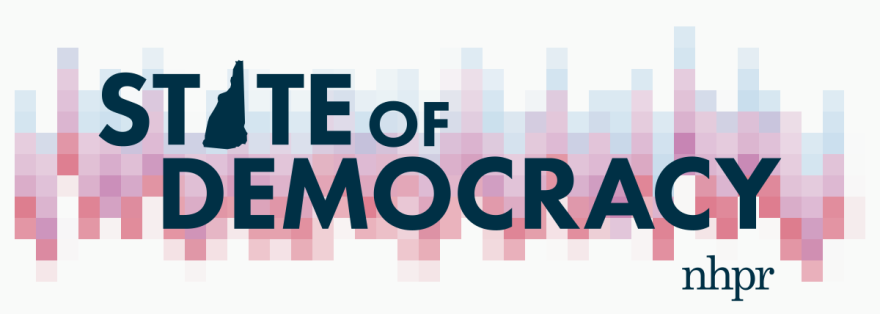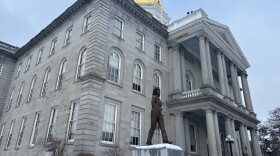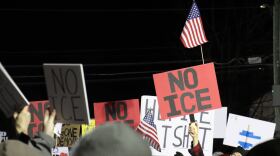Former Missouri Secretary of State (and possible 2020 presidential candidate) Jason Kander is returning to New Hampshire to headline a major Democratic party fundraiser Saturday night.
But apart from his occasional appearances at party events over the past few months, Kander’s political committee, Let America Vote, has all the while been building an on-the-ground presence in the Granite State: rallying opposition to Republican-backed voting laws at the State House and support for Democratic candidates in local races.
Kander’s organization is part of a new wave of outside groups on the left taking an interest in down-ticket elections — not only in New Hampshire but nationwide — with the goal of boosting Democrats’ chances at picking up more seats in this fall’s statewide elections.

Some of these new political players, like the fundraising campaign Flippable, try to help Democrats across the country channel money to like-minded candidates in local swing districts. Others, like Kander’s, are trying to tap into a growing fervor among progressives for making voting rights a top-line campaign issue.
These groups have so far focused on what might seem obscure corners of the state's politics: special elections in far-flung legislative districts, for instance. But they share the goal of generating momentum and building political infrastructure on the left in the run up to both the 2018 midterm elections and the 2020 presidential race.
“Our focus in New Hampshire first will be putting people in office who will stop voter suppression,” Kander said of his group’s efforts. “Once you do that, you have an opportunity to do great things as well.”
Let America Vote currently employs three staffers in New Hampshire and plans to ship in two members of its national team soon, too. The organization is also gearing up to open a field office that will serve as a hub for canvassing and outreach through the fall.
In New Hampshire, Kander said Let America Vote will focus largely on legislative campaigns and the race for governor later this year. Despite his interest in electoral issues, he said he has no immediate plans to get involved in the burgeoning campaign for Secretary of State.
Small dollars but big impact
For a glimpse at what Let America Vote’s statewide strategy might look like in the months ahead, consider its role in the Manchester mayoral race last fall.
Let America Vote contributed $5,000 directly to Democrat Joyce Craig’s campaign in her effort to unseat Republican incumbent Ted Gatsas. The group also sent 11 people to canvass in the final weeks leading up to the election.
While the real battles over ballot access in New Hampshire have played out largely in the State House — not in city halls or local elections — Kander said he wanted to get involved in that race to send a message to the Republican party at large.
“We look for every opportunity to create a political consequence,” Kander said. “The moment that they realize that they can lose elections because they're making it harder to vote, they're going to be a lot slower to do it again next time.”
Let America Vote has also campaigned in six of the 11 legislative special elections held over the last year. Most of their money in those races went toward Facebook and Google advertising, including:
- $3,350 to support Democrat Kevin Cavanaugh, who won the District 16 State Senate election last July
- $2,573 against Republican Mark McLean, who won the Hillsborough County District 44 House election last May
- $1,141 to support Charlie St. Clair, who won the Belknap County District 9 House race last September
- An estimated $1,000 to support Phil Spagnuolo, who won the Belknap County District 3 House election in February
- $456 to support Edith Desmarais, who won the Carroll County District 6 election last May
- $354 to support Josh Adjutant, who lost the Grafton County District 9 election last September
While these might not be record-breaking campaign expenditures, even a few hundred or thousand dollars is a lot of money, relatively speaking, for your average New Hampshire legislative race.
(Story continues below graphic.)
It’s hard to draw a clear line between the efforts of a group like Let America Vote and any individual election outcome, but the ad spending likely benefited Democrats in several ways.
For one, these kinds of ads help to remind people that an election is happening, — something that’s especially important for special elections, which can easily fall under the radar.
Perhaps even more importantly, from a campaign strategy standpoint, this spending could have relieved some financial pressure from the individual candidates running in those races — allowing them to redirect money they would have spent on digital advertising, for example, toward other campaign activities, like local newspaper or radio ads.
Learning from the other side
Of course, this kind of approach is hardly new.
Americans for Prosperity, a libertarian group backed by the Koch Brothers, has managed to establish a firm foothold in New Hampshire politics over the last decade — looking beyond just the two-year election cycle to canvass in off-season elections or get involved in local budget battles.
The operatives behind the latest crop of outside liberal groups acknowledge that what they’re doing is, at least in part, an attempt to replicate a tactic that’s been well-honed by their political opponents.
“One of the things [the Koch Brothers] have done is they've tried to control the machinery of local government so that they can do things to shut down voting rights for people who they don't think are going to vote Republican,” Kander said. “And it's about time that there be a counter to that.”
While Americans for Prosperity has not directly advocated on any voting-related issues in New Hampshire, another Koch Brothers-backed group, the American Legislative Exchange Council, or ALEC, has been linked to a nationwide effort to pass stricter voter identification laws.
“We're definitely playing catch up on this,” says Chris Walsh, a co-founder of Flippable, another organization that recently started channeling money into New Hampshire races. “I think a lot of the strategies that we're using we're taking straight from their [Republicans’] playbook.”
Walsh’s group, Flippable, grew out of a wake-up call he and other former Hillary Clinton staffers came to in the aftermath of the 2016 elections: “Democrats have underinvested in state and local elections."
In an effort to reverse that trend, they set up a website that allows people all across the country to contribute to a “Flippable Fund,” which the organization distributes among local races it deems potentially — you guessed it — “flippable,” i.e. capable of turning from Republican to Democrat.
“The Flippable Fund is made up of grassroots donors, not the Koch Brothers,” Walsh said. “Instead of having the power concentrated in a few people, it's allowing folks from all across the country to have the resources that megadonors have been able to utilize in the past to have their impact multiplied.”
The group says it passes 90 percent of donations onto candidates and uses 10 percent on its own operations.
Beyond its grassroots supporters, Walsh said Flippable does receive additional funding from “institutional backers” and “some large-ticket donors that have been helping us keep the lights on.” But he declined to disclose details about those additional funders at this time, saying some of the agreements aren’t yet final.
In New Hampshire, Flippable chipped in $900 to Democrat Phil Spagnuolo’s successful campaign for a House seat in February — helping to give him a boost in a district President Donald Trump carried by 13 points. Flippable also donated an estimated $100 worth of internet services, according to its campaign finance filings.
Those same filings show that Flippable’s New Hampshire fund raked in more than $7,100 from people as far away as Albuquerque, Denver and Pasadena. Individual donations to the committee have ranged from $30 to more than $1,000 apiece.
Looking ahead to this fall’s elections, Walsh says Flippable has been reviewing its 2018 strategy with local operatives and plans to start making formal endorsements in legislative races following the September primary.
In New Hampshire — as in other states — Walsh says the Flippable team sees an opportunity to connect Democrats across the country with political campaigns that will yield a “high return on investment.”








